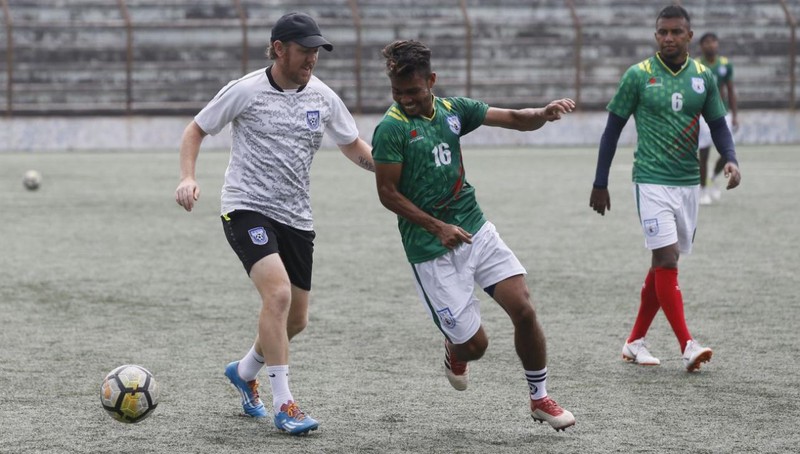 <grammarly-btn>
<grammarly-btn>The battle for the sub-continent's football supremacy is all set to roll today when the 12th SAFF Suzuki Cup gets underway at the Bangabandhu National Stadium with seven nations vying for 'the World Cup of South Asia'.
Hosts Bangladesh will face Bhutan in the second fixture of the opening day's double-header at 7:00pm, after the Nepal-Pakistan match that kicks off at 4:00pm. Satellite television Channel 9 will telecast all the matches of the tournament live from the 'Big Bowl'.
Defending champions India, who made it a trophy of their own by winning the title seven times, will be the team to beat in the regional competition introduced in 1993. In the last eleven editions of the biennial event, Sri Lanka, Maldives, Bangladesh and Afghanistan have won the title once. However, the exclusion of Afghanistan, who played in seven consecutive editions of the tournament since 2003 when Bangladesh hosted the SAFF Championship for the first time, this time have certainly taken some glosses as far as the quality of the championship is concerned.
Afghanistan, now a part of AFC's Central Zone, turned out to be a worthy rival against India in the last three editions with their European-based players making it to the finals and winning the title in 2013 in Nepal. They have always made guest appearances in the tournament, a federation of seven SAARC member nations.
Afghanistan's exclusion however opened up the prospect of reviving some old rivalries.
The SAFF title race was once confined to India and Bangladesh before Bangladesh fizzled out, leaving it a hot battle between India and Maldives. The Islanders were pushed back following the emergence of Afghanistan.
This time around, the title race might be a three way battle involving 10-time finalists India, three-time finalists Maldives and Bangladesh, who also played the final three times in a row.
Although Bangladesh's record in recent past gives hardly any hope as the once powerful football nation in the subcontinent were eliminated from the group stage of the last three editions, the men in red and green however showed signs of reviving their battered image with the magnificent performance in the just concluded Asian Games, where they made it to the round of 16 for the first time.
The remaining teams -- Nepal, Bhutan and Pakistan -- never played the SAFF Championship final while Sri Lanka failed to show their mettle in the last 23 years since making it to the finals in 1993 and 1995.
Bangladesh, however, did well whenever they hosted this tournament. They won their maiden SAFF title on home turf in 2003. They also made it to the semifinals when they hosted the event again in 2009.
Bangladesh are hosting the championship for the third time after a gap of nine years and everyone expects that the home side, who have set their sights on getting past the group stage, to shrug off their shaky performance at the international arena under their English coach Jamie Day and emulate the feat of 2003.
Bangladesh are one of five teams who have foreign coaches, including India, Bhutan, Pakistan and Maldives while Sri Lanka and Nepal chose their home-grown coaches to guide their respective sides.
The SAFF Championship has always been a platform from where players shot to stardom with their scintillating performances. India's star striker Sunil Chhetri and Maldives mercurial marksman Ali Ashfaq are two prominent names who made their grade by playing in the championship. However they opted out, leaving the stage open for the new stars to be born.
-@sports.life(AnisurRahman)
Comments